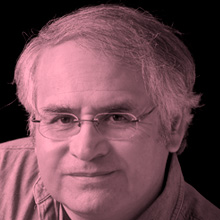El humor es una manera de pararse frente a la vida
Guillo es el nombre artístico de Guillermo Bastías Moreno (1950) es dibujante editorial, ilustrador y videísta chileno.
Estudió Arquitectura sin titularse y Dirección de Cine en Chile y en Alemania.
Sus dibujos han sido publicados en varias otras revistas y diarios de Chile y en el extranjero en el Boston Globe (USA), Le Monde (Francia), Frankfurter Rundschau (Alemania) y El Mundo (España).
¿Los premios y distinciones obtenidos? Primer Premio en el Salón Internacional de la Caricatura de Montreal, Canadá (1987), Primer Premio en el Concurso de Humor Gráfico de Duisburg, Alemania (1992), Premio Julieta 1990, otorgado por las organizaciones feministas de Chile y Mención Honrosa en el Concurso Internacional Encuentro de Dos Mundos, México (1992).
Ha publicado media docena de libros (muy vendidos). Ha expuesto unas cuantas veces en Chile y en Brasil, Colombia, Cuba, Canada y próximamente en Paris.
Pero dejaré de dar datos. De su biografía, excepto que en este mes de noviembre de 2023 acaba de recibir el Premio Nacional de Humor.
Todo eso es más que suficiente para invitarlo a “dialocar” aquí. Pero debo de decir algo que no es importante quizás para muchos, pero para mí sí lo es: a mi llegada a Chile a principios de los años 90, me lo presentaron y me cayó muy bien. Lo he seguido siempre en sus publicaciones por su calidad humorística y por ello no dudé en votar por él al escogerlo como Premio Nacional de Humor, ya que estuve como Jurado. Y menciono que se escogió por unanimidad. Por eso me alegro mucho por él. Se lo merecía.
Y se merece también que no espere más y pase ya a entrevistarlo…
PP: Querido Guillo, ¿te presenté bien? Me gustaría que te presentaras tú mismo, pero sin datos. ¿Cómo quieres que te conozca la gente ahora? Incluso, ¿cómo quieres que te conozcan dentro de 40 años?
GUILLO: Actualmente soy un joven de la tercera edad.
Yo dibujé desde niño porque era más bien tímido e introvertido y con el dibujo lograba comunicarme mejor en ese entonces con mi entorno. De más grande en la universidad me sirvió para destacarme y lograr la atención de mis compañeras y amigas. El dibujo es seductor y yo le agradezco mucho eso a este amigo de toda la vida. Me hice dibujante profesional en Alemania. Fui a ese país a estudiar Dirección de Cine pero volví a Chile como dibujante. Descubrí allá este arte y que me podía dedicar a este maravilloso oficio de dibujar.
En lo personal y respondiendo a tu pregunta, quisiera ser recordado como un artista honesto que reflejó en su trabajo lo que lo tocó vivir y que hizo de su vida la búsqueda de la belleza, del humor, del amor y la libertad. Y, que a fin de cuentas, trató de responder a la simple pero importante pregunta: Somos felices como vivimos?
PP: Bueno, algunos te dirán que no lo son, otros que sí son felices, otros que nunca se lo han preguntado. Pero a todos sí es nuestro deber decirles que incluso si lo son, podrían serlo más, ¿no es cierto? Esa es una de las cosas que hace imprescindible el humor. Y sobre eso, ¿cómo llegaste a la decisión de dedicarte al humor gráfico?
GUILLO: Yo soy curioso por naturaleza y desde muy joven me ha gustado estar informado. También aprendí a ser desconfiado de la información recibida y a leer entre líneas las noticias oficiales. Por todo ello el dibujo ha sido mi forma de responder a los estímulos que recibo en el día a día.
PP: Eso explica tu inclinación al humor satírico, especializado en política. ¿Por qué quisiste dedicarte a esa modalidad? ¿El humor político derriba gobiernos? Pregunto por gusto, ya que sabemos que no, pero la hice para preguntarte mejor, ¿por qué lo haces entonces?
GUILLO: Sí, soy especializado en lo que se llama dibujo editorial. Es ese tipo de humor de reflexión y de opinión de lo que nos sucede como comunidad no sólo local sino que también planetaria. Pero el tema de un dibujo editorial no es sólo político sino que también todo hecho que sea un notición o sea, motivo de titular de un periódico o noticiero de TV. Lo que está en primera plana y que puede ser algo deportivo, climático, etc. Por ejemplo que Chile le gane a Brasil o a Argentina 7 a 0 es un notición y merece un dibujo editorial.
Pero no sólo dibujo temas editoriales de carácter político. Casi todos mis premios internacionales son por dibujos con temas universales como el “descubrimiento” de América , la mujer, las relaciones de pareja, los OVNIS, etc.
Que gran parte de mi obra sea de humor político se debe a que soy de una generación de chilenos que vivimos permanentemente grandes e importantes hechos políticos como ninguna otra generación. El gobierno del presidente Allende, el Golpe de Estado del poder económico de mi país y el terrorismo posterior de Pinochet, la recuperación de la democracia, etc., etc. Un dibujante editorial se debe al contexto en el que vive. No es sólo imaginación, es la imaginación alimentada por la realidad.
Hago humor editorial porque a mí me importa lo que le pasa a mi país y a mis compatriotas.
PP: Permíteme salir en mi defensa: a mí me importa lo que pasa en mi país, a mi gente y lo que sucede en el mundo en general, pero no tengo talento para hacer humor sobre esos temas. Me “sale” casi siempre “humor blanco para hacer pensar y/o para hacer reír solamente”. Por eso los envidio a ustedes. Y para continuar con el humor político, ¿el humor es de izquierda o de derecha? ¿O de ambos o de ninguno?
GUILLO: No es de ninguno. El humorista gráfico lo hace desde sus valores en la vida, por lo que puede chocar con los errores, abusos o delitos ya sean de la derecha o de la izquierda sin distinción. Creo que así lo debe hacer un dibujante honesto, libre y soberano.
PP: Estoy de total de acuerdo contigo. Oye, ¿te han censurado alguna vez? ¿Te autocensuras mucho?
GUILLO: Sí, tanto en la Dictadura como paradojalmente en Democracia.
Me autocensuro con temas que considero delicados de abordar y que pueden herir a personas.
PP: Correcto. Ese aspecto de la autocensura habla muy bien de ti. ¿Y cuáles son los límites del humor en tu caso?
GUILLO: Mi límite es hacer humor sobre enfermos tanto físicos como mentales, así como ridiculizar a la diversidad sexual. También es un límite para mí hacer humor en base a menospreciar y ridiculizar a la mujer.
PP: Para ti, ¿qué es el humor? ¿Qué es el humor gráfico?
GUILLO: Para mí es una manera de pararse frente a la vida que se refleja en una idea expresada por líneas y colores. En lo personal, y por todo lo vivido, el humor gráfico ha sido muy importante para mantener mi mente lo más saludable posible y con el espíritu arriba. En lo personal yo dibujo en primer lugar para mí, para mi felicidad. Después lo mágico es la comunicación que se produce con la gente lectora a la cual tu trabajo le llega a hacer sentido en su propia búsqueda de cómo pararse en este mundo y a su necesidad de existir como seres humanos y ciudadanos. Nos hermanamos en la sonrisa en ese instante fecundo. Esa profunda comunicación con las personas es aquella felicidad que todos los artistas sin distinción atesoramos.
PP: De acuerdo también. Ahora, ¿puedes contarme una anécdota graciosa, curiosa o ingeniosa que te haya sucedido en tu carrera en la caricatura?
GUILLO: Una vez conversando un vinito con Quino aquí en Santiago le pregunté por qué se volaba en sus viñetas dibujando filigranas y super achurados en cortinajes, alfombras y cielos de aposentos cuando el humor estaba en un rínconcito inferior con dos viejitas conversando y su texto y funcionaría igual. Quino se quedó pensando. Yo me dije interiormente el Maestro va a hablar y me dará una lección más. Luego de pensarlo me dijo, mira Guillo, ustedes los chilenos tienen una palabra muy buena y certera para responderte: De weón no más.
Nos reímos mucho y terminamos la botella.
PP: Buena, anécdota. Debo decirte que yo disfruto muchísimo todo ese dibujo “de más” en los chistes de Quino. Bueno, ¿cómo ves la salud del humor gráfico en la actualidad? ¿Y cómo ves su futuro?
GUILLO: Está sanito y robusto. Hace poco estuve en el gran Festival del Comic Aguacero de Valdivia y vi mucho artista joven con una buena producción de dibujos con temáticas existenciales muy buenas. Le veo buen futuro. Si bien es cierto no hay revistas ni periódicos que los acojan lo compensan publicando en Internet y con editoriales pequeñas, pero muy vigorosas y entusiastas.
PP: El problema de no tener espacios para publicar me lo señalan muchos colegas. E Internet aún no ha resuelto el problema del pago. En fin, parece que como dices hay más creadores, por lo que necesitamos más espacios. Amigo mío, ¿te gustaría hacer algo dentro del humor que no hayas hecho aún?
GUILLO: Sí, pero no me gusta hablar antes de realizar los proyectos..
PP: Haces bien. ¿Y se te ocurre una pregunta que te hubiera gustado que te hiciese y no te hice? Si es así, ¿puedes responderla ahora?
GUILLO: No, todo estuvo bien.
PP: Perfecto. Entonces, para ir cerrando, ¿puedes decirles unas palabras a nuestros seguidores de Humor Sapiens?
GUILLO: Simplemente decirles que el Humor es bueno para la salud.
PP: Muy bien. Querido Guillo, mil millones de gracias por aceptar este “diáloco”, por dedicarle tu tiempo y energía a responderlo todo. Y ojalá la hayas pasado tan bien como yo. Te deseo mucha salud y que sigan tus éxitos!!
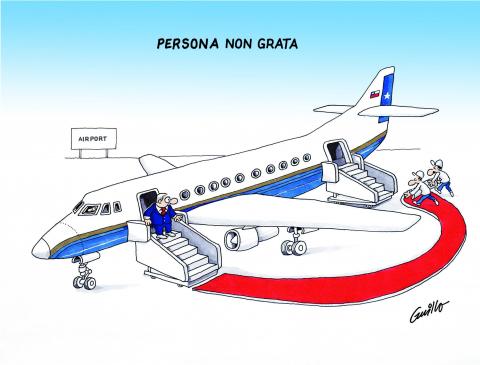
Persona non grata | Guillo
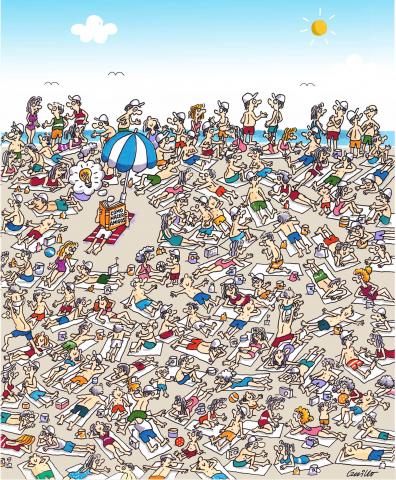
Vacaciones solo | Guillo
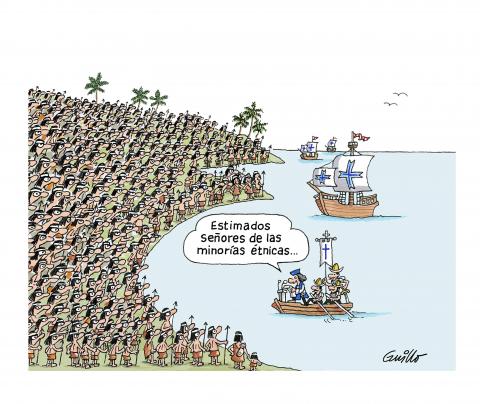
Minorías étnikas | Guillo
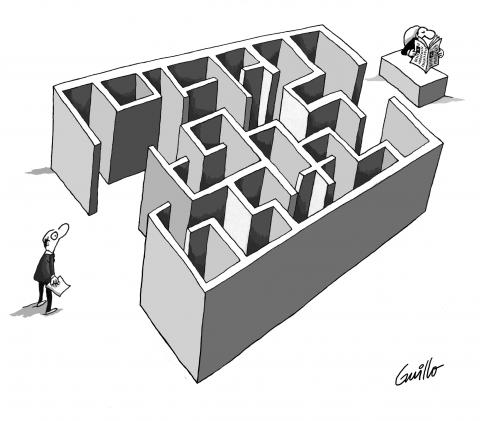
Burocracia | Guillo
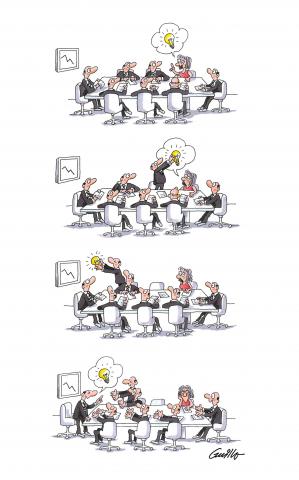
Ampolleta y mujer | Guillo
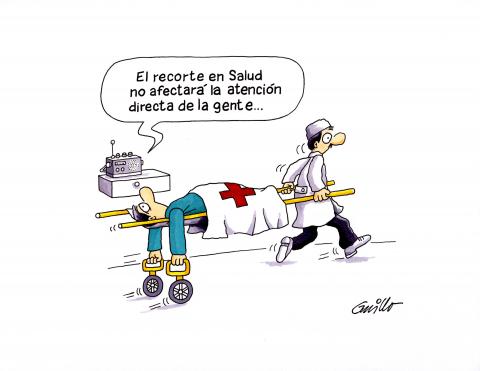
Recorte presupuesto Salud | Guillo
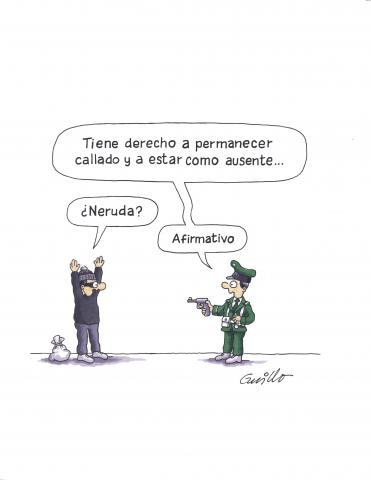
Ladrón y Neruda | Guillo
Interview with Guillo
By Pepe Pelayo
Humor is a way to face life
Guillo is the stage name of Guillermo Bastías Moreno (1950), a Chilean editorial cartoonist, illustrator and video artist.
He studied Architecture without a degree and Film Direction in Chile and Germany.
His drawings have been published in several other magazines and newspapers in Chile and abroad in the Boston Globe (USA), Le Monde (France), Frankfurter Rundschau (Germany) and El Mundo (Spain).
The awards and distinctions obtained? First Prize in the International Caricature Salon of Montreal, Canada (1987), First Prize in the Graphic Humor Contest of Duisburg, Germany (1992), Julieta Prize 1990, awarded by the feminist organizations of Chile and Honorable Mention in the Contest International Meeting of Two Worlds, Mexico (1992).
He has published half a dozen books (best sellers). He has exhibited a few times in Chile and in Brazil, Colombia, Cuba, Canada and soon in Paris.
But I will stop giving data. From his biography, except that in this month of November 2023 he has just received the National Humor Award.
All of that is more than enough to invite you to “dialocate” here. But I must say something that may not be important for many, but for me it is: upon my arrival in Chile at the beginning of the 90s, they introduced me to him and I liked him very much. I have always followed him in his publications for his humorous quality and that is why I did not hesitate to vote for him when choosing him as the National Humor Award, since I was on the jury. And I mention that it was chosen unanimously. That's why I'm very happy for him. He deserved it.
And he also deserves to not wait any longer and come interview him now...
PP: Dear Guillo, did I introduce you well? I would like you to introduce yourself, but without data. How do you want people to know you now? Even how do you want to be known in 40 years?
GUILLO: Currently I am a young elderly man.
I drew since I was a child because I was rather shy and introverted and with drawing I was able to communicate better with my surroundings at that time. When I was older at university it helped me stand out and get the attention of my classmates and friends. The drawing is seductive and I am very grateful to this lifelong friend for that. I became a professional cartoonist in Germany. I went to that country to study Film Direction but returned to Chile as a cartoonist. I discovered this art there and that I could dedicate myself to this wonderful craft of drawing.
Personally, and in response to your question, I would like to be remembered as an honest artist who reflected in his work what he had to live through and who made his life the search for beauty, humor, love and freedom. And, at the end of the day, he tried to answer the simple but important question: Are we happy the way we live?
PP: Well, some will tell you that they are not, others that they are happy, others that they have never asked themselves. But it is our duty to tell everyone that even if they are, they could be more so, right? That is one of the things that makes humor essential. And on that note, how did you come to the decision to dedicate yourself to graphic humor?
GUILLO: I am curious by nature and from a very young age I have liked to be informed. I also learned to be distrustful of the information received and to read between the lines of official news. For all these reasons, drawing has been my way of responding to the stimuli I receive on a daily basis.
PP: That explains your inclination towards satirical humor, specialized in politics. Why did you want to dedicate yourself to that modality? Does political humor bring down governments? I'm asking for pleasure, since we know you're not, but I asked it to better ask you, why are you doing it then?
GUILLO: Yes, I specialize in what is called editorial drawing. It is that type of humor of reflection and opinion of what happens to us as a community, not only local but also planetary. But the theme of an editorial cartoon is not only political but also any fact that is news, that is, the reason for the headline of a newspaper or TV news program. What is on the front page and which can be something sporting, climatic, etc. For example, Chile beating Brazil or Argentina 7 to 0 is news and deserves an editorial drawing.
But I don't only draw editorial topics of a political nature. Almost all my international awards are for drawings with universal themes such as the “discovery” of America, women, relationships, UFOs, etc.
That a large part of my work is political humor is due to the fact that I am from a generation of Chileans who constantly experience great and important political events like no other generation. The government of President Allende, the Coup d'état of the economic power of my country and the subsequent terrorism of Pinochet, the recovery of democracy, etc., etc. An editorial cartoonist is due to the context in which he lives. It's not just imagination, it's imagination fueled by reality.
I do editorial humor because I care about what happens to my country and my compatriots.
PP: Allow me to come to my defense: I care about what happens in my country, about my people and what happens in the world in general, but I have no talent for making humor about those topics. I almost always get “white humor to make you think and/or just to make you laugh.” That's why I envy you. And to continue with the political humor, is the humor left-wing or right-wing? Or both or neither?
GUILLO: It doesn't belong to anyone. The graphic comedian does so from his values in life, which is why he can clash with errors, abuses or crimes, whether from the right or the left without distinction. I believe that this is what an honest, free and sovereign cartoonist should do.
PP: I totally agree with you. Hey, have you ever been censored? Do you censor yourself a lot?
GUILLO: Yes, both in the Dictatorship and, paradoxically, in Democracy.
I censor myself with topics that I consider delicate to address and that can hurt people.
PP: Correct. That aspect of self-censorship speaks very well of you. And what are the limits of humor in your case?
GUILLO: My limit is to make humor about both physical and mental illnesses, as well as ridicule sexual diversity. It is also a limit for me to make humor based on belittling and ridiculing women.
PP: For you, what is humor? What is graphic humor?
GUILLO: For me it is a way of standing in front of life that is reflected in an idea expressed by lines and colors. Personally, and because of everything I have experienced, graphic humor has been very important to keep my mind as healthy as possible and with my spirit up. Personally, I draw first of all for myself, for my happiness. Then the magical thing is the communication that occurs with the reading people to whom your work makes sense in their own search for how to stand in this world and their need to exist as human beings and citizens. We are brothers in smiles in that fertile moment. That deep communication with people is that happiness that all artists without distinction treasure.
PP: Agreed too. Now, can you tell me a funny, curious or clever anecdote that happened to you in your career in cartooning?
guillo it would work the same. Quino was left thinking. I told myself internally the Master is going to speak and give me one more lesson. After thinking about it he told me, look Guillo, you Chileans have a very good and accurate word to answer you: De weón no más.
We laughed a lot and finished the bottle.
PP: Good, anecdote. I must tell you that I really enjoy all that “extra” drawing in Quino's jokes. Well, how do you see the health of graphic humor today? And how do you see its future?
GUILLO: He is healthy and robust. I was recently at the great Aguacero Comic Festival in Valdivia and I saw a lot of young artists with a good production of drawings with very good existential themes. I see a good future for him. While it is true that there are no magazines or newspapers that accept them, they make up for it by publishing on the Internet and with small, but very vigorous and enthusiastic publishers.
PP: The problem of not having spaces to publish is pointed out to me by many colleagues. And the Internet has not yet solved the payment problem. Anyway, it seems that, as you say, there are more creators, so we need more spaces. My friend, would you like to do something in humor that you haven't done yet?
GUILLO: Yes, but I don't like to talk before carrying out projects.
PP: You are doing well. And can you think of a question that you would have liked me to ask you but I didn't? If so, can you answer it now?
GUILLO: No, everything was fine.
PP: Perfect. So, to close, can you say a few words to our Humor Sapiens followers?
GUILLO: Simply tell them that Humor is good for your health.
PP: Very good. Dear Guillo, thank you a billion for accepting this “dialogue”, for dedicating your time and energy to answering everything. And I hope you had as good a time as I did. I wish you good health and may your successes continue!!
(This text has been translated into English by Google Translate)

